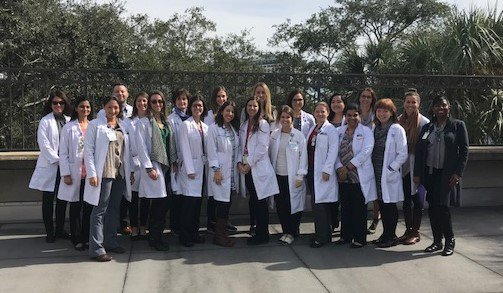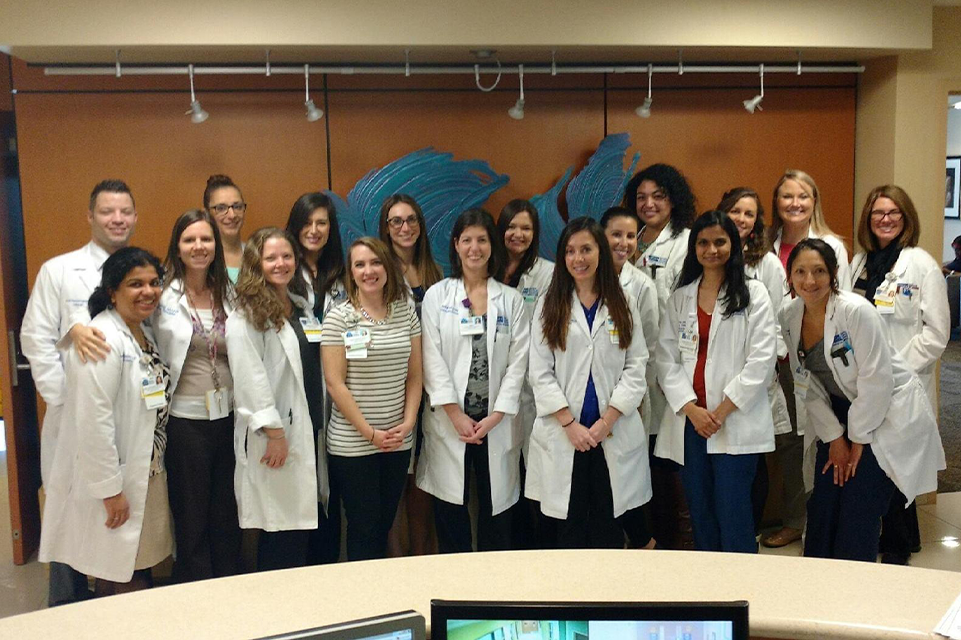National Nutrition Month Spotlight: TGH Clinical Nutrition Services
Published: Mar 16, 2022By Tom Zebold


In honor of National Nutrition Month in March, Tampa General Hospital provides readers with an inside and in-depth look at its dedicated Clinical Nutrition Services team that works together and in partnership with other interdisciplinary services to provide excellent patient care.
Dr. Beverly Hernandez, director of Clinical Nutrition Services at Tampa General Hospital, presented a striking figure that everyone should keep in mind before, during and after National Nutrition Month in March – more than 37 trillion.
That is the number of cells in the human body and every single cell in the human body is made up of nutrients.
“Nutrition is essential to life because all of those nutrients can’t be manufactured by the body and most come from the food we eat,” Dr. Hernandez explained. “Understanding the science behind food and how it relates to improving health, allowing the body to have adequate energy to do its work and its daily function or just provide healing is what registered dietitians do very effectively every day.”
Fortunately for patients at Tampa General, the leading academic medical center features a Clinical Nutrition Services staff of 26 team members who are dedicated to delivering world-class care and education, improving health outcomes, decreasing length of stay in the hospital and preventing unwanted readmissions.
Translating the science of nutrition into clinical practice, this “cohesive” team of registered dietitians is assigned to every patient care unit in the hospital – from birth/neonatal ICU through geriatric and adult ICUs. Each team member is licensed by the Department of Health and holds at least one specialty focus, including solid organ transplant (lung, heart, pancreas, kidney, liver), cancer, diabetes, pediatrics and much more. All registered dietitians are registered by the Academy of Nutrition and Dietetics, which created its board certifications and annual National Nutrition Month campaign.
“It’s nice we all have our owns areas of expertise,” said pediatric dietitian, Erika Holt, RD, LDN. “Typically, pre-pandemic, the same types of patients would go to the same types of floors. Now during the pandemic, especially when beds are short, we’re finding that different types of patients may be on our floors that we’ve never seen before. We know that we’ve got somebody on our team who specializes in that type of patient. We can ask questions and we’re always willing to help each other out, lend a hand.”
Collaboration and teamwork really come in handy for TGH Clinical Nutrition Services because as patients go through their continuum of care, they are likely to interact with different members of the team, depending on which area of the hospital they are transferred to. Clinical Nutrition Services also provides care in an outpatient setting for patients receiving medical treatment without being admitted to the hospital.
“We all have to work together. We all have to be engaged, and we all like each other,” Susan Walters, MS, RDN, LDN, said with a smile.
Working on a tight-knit team is beneficial because every day is fast paced, and every year is a marathon. Just in 2021 alone, TGH Clinical Nutrition Services recorded more than 170,000 consultations with patients.
“The goal is to prevent treatment breaks,” said Alexandra Fucarino, MS, RD, CSO, LDN. The more treatment breaks patients have, or the longer treatment breaks they have, the worse their outcome is going to be. Dehydration, malnutrition, loss of strength, weight loss, deconditioning – these all can lead to hospital readmissions, these can lead to treatment breaks. The nutrition is really a key part of that. We can also be advocates for the patients.”
Registered Dietitians’ Roles and the Patient Journey
TGH’s team of registered dietitians are called for duty within 24-48 hours after a patient is admitted to the hospital. Once a doctor conducts a patient evaluation and gives a specific consult and diet order, a checklist of items can trigger a nutrition consult, including:
- A patient’s difficulty swallowing
- Unintended weight loss
- Uncontrolled diabetes
Once registered dietitians meet with the patient, review medications and medical history, “it then becomes our responsibility to identify the nutritional implications that are associated with those things,” Dr. Hernandez said.
From there, registered dietitians have within 30-45 minutes to complete the initial assessment, noting exactly what they’ve done for the patient and making recommendations about the nutrition items needed and why. Registered dietitians also write some nutritional orders after the physician places a patient on a diet.
Communication between the Clinical Nutrition Services team is key, and that can make the assessment completion process very quick, especially in the ICU.
“If I end up getting a pediatric patient, or if one of (another team member’s) patients transfers by, it’s easy to call them up and ask them more specifically about what I need,” said Rocco Russo, MS, RD, LDN, CNSC, who works in the ICU. “Pretty much, the conversations are really 2-3 minutes. It’s become so efficient to know what you’re looking for.”
Registered dietitians also keep individualized care at the forefront, ensuring what they advise is culturally relevant for the patient.
Some patients are unable to eat or adequately digest food, and these patients may need total parenteral nutrition (TPN), which is infusing a specialized form of food through a vein. Registered dietitians work with TGH pharmacists for nutrition support in this area, and also continuously educate patients and their family members on the medical nutrition plan.
“We’re trained in not just diet. It may involve nutrition support, using feeding tubes for nutrition or TPN, which is IV nutrition, fluids and electrolytes,” said Fucarino, who works with oncology patients in an outpatient setting. “A lot of patients will go home and have a gastric feeding tube, not knowing what to do with it. We can show them. Education is something that I think a lot of people take for granted, but it makes such a difference for the patient, helping them feel comfortable and secure.”
Continuity of care also consists of follow-up assessments to ensure the patient is on the right path to recovering muscle mass, strength and is getting the proper nutrition necessary to recover.
After the initial assessment, Clinical Nutrition Services makes sure to follow up with high-risk patients in three to five days. Moderate-risk patients are followed up with in five to seven days, and low-risk patients in seven to 10 days. All patients are reassessed within 30 days of their initial assessment, regardless of risk.
Diagnosing Malnourished, Food Insecure Patients Takes a ‘Medical Village’
For registered dietitians, a main focus is identifying and helping to treat malnutrition. Its forms include undernutrition, inadequate vitamins and minerals, being overweight, obesity, and resulting diet-related noncommunicable diseases.
“It doesn’t discriminate,” said Holt. “I’ve done an evaluation on a 3-month-old who is malnourished. It could be anybody across the spectrum.”
Progress in identifying malnourished patients has increased significantly at TGH since 2019, and that success leads to improving health outcomes, decreasing lengths of stay in the hospital and lowering hospital readmission rates.
“There are a lot of studies on if you feed (patients) enterally – through the tube feeding early on, especially in trauma – you can reduce ICU stay,” said Walters. “There’s all kinds of studies we are currently teaching, preaching and actively doing. We don’t practice medicine, we definite it (at TGH). That’s what we do in nutrition.”
Identifying malnourished patients is a group effort, according to registered dietitians. Clinical Nutrition Services takes pride in educating medical students and team members on “nutrition-focused physical exams.” TGH has proactive physicians on staff who sometimes provide a diagnosis before registered dietitians can act. Conversations with nurses and the clinical staff also help pinpoint food insecurity, which triggers consultations with the Clinical Nutrition Services staff.
“A lot of times, it’s just collaborating with the team is how we end up picking out patients who really need us the most,” Holt said. “Then, you’re thankful for being a part of the medical village.”
To Heal and to Teach
In addition to educating TGH team members and patients about nutrition, registered dietitians are also guiding future professionals in their field through the USF Dietetic Internship program.
Currently in its fifth cohort, the program has five interns being training by the Clinical Nutrition Services staff. Once they’ve completed the program, interns must complete their master’s degree and take the board exam to become registered dietitians. To date, all USF Dietetic Internship participants have passed the board exam and at least three have been hired by TGH.
In addition to teaching, each member of Clinical Nutrition Services is continuously learning.
“We have the knowledge of how the metabolism works and even biochemistry,” said Fucarino. “We can translate that to the patient. It’s our job to stay up to date with the most current research on what is evidence-based and what’s out there as far as nutrition therapy.”
Registered dietitians are rewarded for their learning efforts. TGH offers a clinical ladder for registered dietitians to achieve advanced practice Levels I, II and III.
“Coming to this team, I definitely felt I had every resource at my fingertips to learn from my colleagues and advanced my education if I wanted to,” said Kelsey Gemmill, MS, RDN, LDN. “I feel like I’ve had an opportunity to grow here.”
Additionally, Clinical Nutrition Services conducts ongoing clinical research projects and has had several studies published in medical journals.
Caring for the Community
TGH’s compassionate team of registered dietitians takes great pride in improving health outcomes by tirelessly communicating with patients on proper nutrition that can lead to amazing outcomes.
“We’re here to help and we want to make all those messages our patients are getting make sense to them,” said Rachel Sample, RD, LDN. “It’s something they can use to be successful once they leave.”
One prime example is a patient who was in critical condition with severe burns while in the hospital. Once on a breathing machine and intubated with major trauma, the patient provided a huge surprise to his registered dietitian several months later in rehabilitation.
“It comes down to living or dying with those patients because if you lose your skin, you’re losing calories, you’re losing protein,” Walters said. “… I looked at him and I didn’t even recognize him because he looked so good!”
Success after being discharged from TGH also involves Clinical Nutrition Services continuing to advocate for patients through community outreach partnerships. Through a grant with Blue Cross Blue Shield and a partnership with Meals on Wheels, one two-plus-year program provided food insecure patients with homecooked meals seven days a week for two weeks after hospital discharge.
TGH Nutrition Services established another partnership with Feeding Tampa Bay to provide groceries to that similar population every Monday at Tampa General’s Healthpark location on North 30th Street. Usually, about 30 patients participate in the program that normally last six weeks. Clinical Nutrition Services and TGH’s nursing staff members make calls to the identified patient population, asking if they would like to participate.
“We have just been designated by Press Ganey as a Tier I team, meaning that we are highly engaged,” said Hernandez of Clinical Nutrition Services. “I’m so impressed with their productivity and the way that we collaborate.”
“I’m very proud to work here,” Fucarino said.
